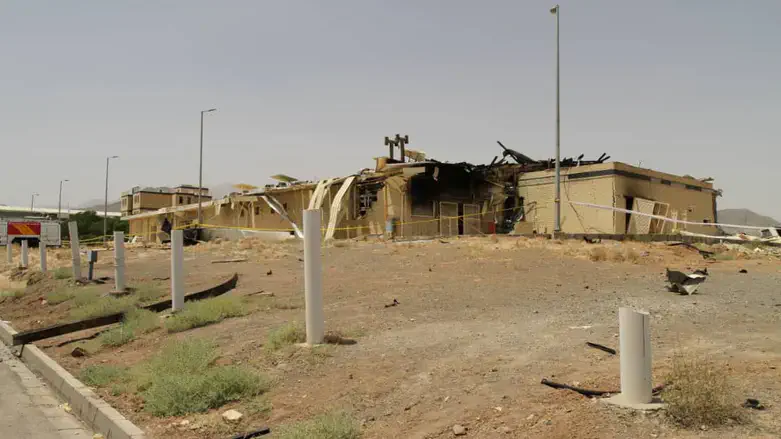by Dr. Avi Perry
There is an additional, even more important, potentially long-term, and far more productive solution to ending the conflict with Iran once and for all. Opinion.
 |
| Damage at Iran's Natanz nuclear facility Reuters |
When will the war end? The answer most given by experts is: ?????. While it's certainly one of the most insightful responses, there are a couple of other valuable perspectives as well
Many Israelis hope for U.S. military involvement in the war—specifically, using American bunker-buster bombs to destroy the nuclear facility at Fordow. Israel currently lacks the bunker-busting capability needed to effectively penetrate and destroy the facility.
The Iranian nuclear facility at Fordow is considered a key component in Iran’s potential nuclear weapons development for several critical reasons:
1. Location and Fortification
- Deep underground: Fordo is built into a mountain near the city of Qom, making it extremely difficult to destroy with conventional airstrikes or bunker-busting bombs.
- Hard to detect and access: Its concealed and fortified nature raised immediate suspicions when it was revealed in 2009, especially since Iran had not declared it to the IAEA (International Atomic Energy Agency), violating its safeguards agreement at the time.
2. Enrichment Capabilities
- High-level uranium enrichment: The facility has been used to enrich uranium to levels as high as 60% purity—just short of weapons-grade (which is ~90%).
- Advanced centrifuges: Fordo houses advanced IR-6 centrifuges, which enrich uranium faster and more efficiently than older models.
3. Strategic Redundancy
- Fordo serves as a backup facility to Natanz (another major enrichment site). If Natanz were damaged or attacked, Fordo could continue enrichment activities, ensuring Iran's program has resilience.
4. Weaponization Potential
- Enriching uranium to higher levels at Fordo shortens the “breakout time” — the time Iran would need to produce enough weapons-grade uranium for a bomb if it chose to do so.
- Its small size and secrecy suggest it’s more suitable for sensitive work like producing weapons-grade material, rather than for civilian energy purposes.
Fordow is central to concerns about Iran’s nuclear ambitions because of its concealment, protection, advanced enrichment capacity, and potential for producing weapons-grade uranium.
While Iran insists its nuclear program is peaceful, Fordo’s characteristics make it a focal point in nonproliferation discussions.
If the Fordo nuclear facility is not destroyed, Israel’s objective of eliminating what it sees as an existential threat from Iran will remain unresolved, casting a persistent shadow over the region. As long as Iran’s leadership continues to espouse genocidal rhetoric and openly declares its intention to eliminate Israel, the prospects for ending the conflict remain bleak.
For many, the only realistic path to winning the war involves direct American military intervention—either through U.S. airstrikes or by equipping Israel with the necessary tools to carry out the mission themselves.
But there is an additional, even more important, potentially long-term, and far more productive solution to ending the conflict with Iran once and for all. This solution is not only quietly favored by Israel and much of the civilized world, but it is also a goal for which many Iranian citizens would risk their lives: a new Iranian revolution that topples the Ayatollah regime and brings about a fundamental change in leadership.
Such a regime change could pave the way for a government that is friendly toward the West, the United States, and even Israel. The radical Islamists, the fanatics who have held the nation hostage, would be pushed to the margins of society, stripped of their power and influence. They would shrink into a small, irrelevant minority, lost within the confines of their own dogmatic and ruthless ideology.
The new regime would most likely be disinterested in nuclear weapons, and the existential threat to Israel and to Iran’s neighbors and anyone else would cease to exist naturally.
The path to achieving this preferred solution begins with the removal of Iran’s current political leadership—starting with Ayatollah Khamenei and his inner circle. While such a move could spark short-term unrest and possibly violent upheaval, it would likely destabilize the regime and embolden the Iranian people to rise up and reclaim their future.
Israel and the United States should quietly support and facilitate this transformation—offering encouragement, resources, and strategic backing to the revolutionaries—to ensure the regime’s collapse and the emergence of a freer, more peaceful Iran.
It has been reported that President Trump vetoed Israel’s plan to eliminate the Ayatollah and dismantle the regime’s leadership structure. This report may be purposely misleading, but if it is accurate, then it reflects a significant blind spot in his strategic judgment. He may have failed to recognize that such an action could be the linchpin in ending the long-standing conflict with Iran.
A successful regime change would not only defuse one of the most dangerous threats in the Middle East, but it would also spark global relief—and likely celebration. Most notably, the greatest beneficiaries of this shift would be the Iranian people themselves. After decades of oppression under a brutal theocracy, they would finally have a chance to reclaim their country and their future. Their joy and liberation would echo far beyond Iran’s borders.
Dr. Avi Perry, talk show host at Paltalk News Network (PNN)NN), is the author of "Fundamentals of Voice Quality Engineering in Wireless Networks,"and "72 Virgins," a thriller about the covert war on Islamic terror. He was a VP at NMS Communications, a Bell Laboratories - distinguished staff member and manager, as well as a delegate of the US and Lucent Technologies to the ITU—the UN International Standards body in Geneva, a professor at Northwestern University and Intelligence expert for the Israeli Government. Web site: www.aviperry.org
Dr. Avi Perry
Source: https://www.israelnationalnews.com/news/410084
No comments:
Post a Comment